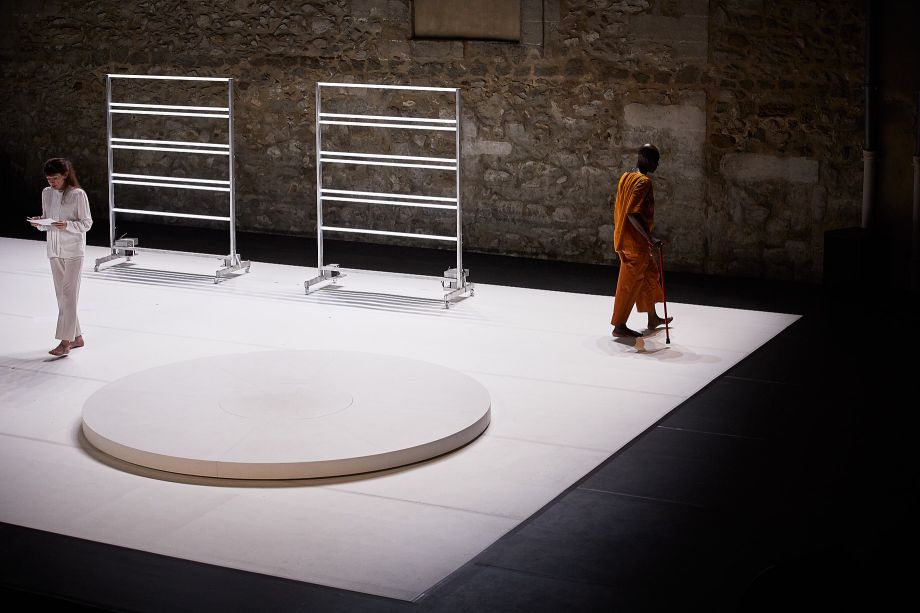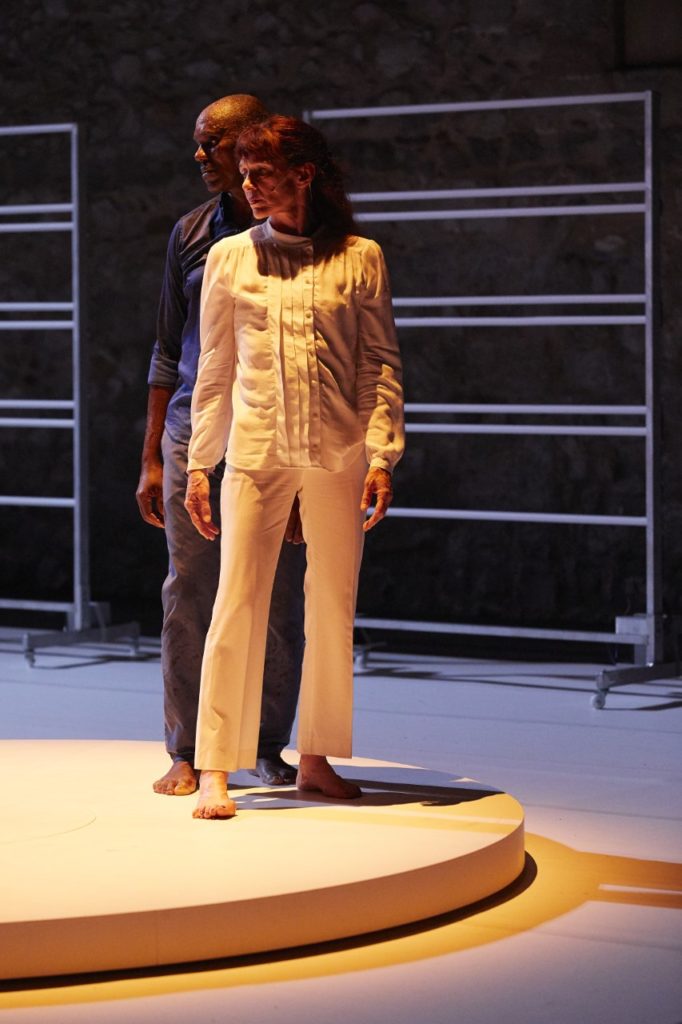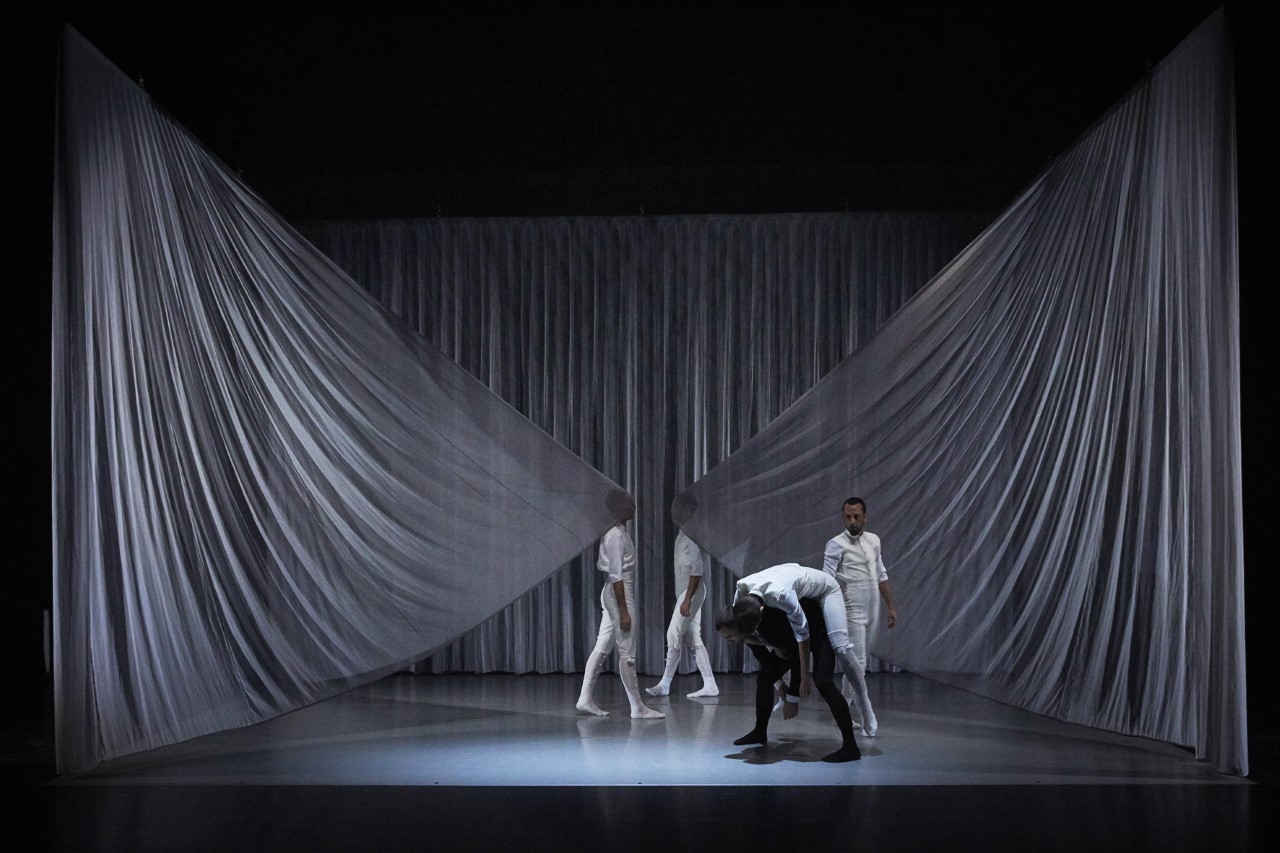Avignon 2019: In search of multiple selves: “Multiple-S”by Salia Sanou and “Oskara” by Kukai Dantza

The focus of this review is inspired by the title and the theme of Salia Sanou’s multidisciplinary creation Multiple-S that he brought to Avignon 2019. Migration, exile, economic travel and global tourism created a myriad of people who identify themselves with many languages, cultural traditions and habits at the same time. Multiplicity is the name for their state of being and for their minds.
Multiple-S by Salia Sanou and Oskara by Kukai Dantza offer two different artistic and philosophical takes on this aspect of the age of globalization. In these interdisciplinary works, the artists of different backgrounds, dancers, musicians, signers and a poet engage with one more pressing issue of our time – the sense of divided self and the loss of roots.

In Multiple-S Salia Sanou asks: “Who are you Salia Sanou? Who am I, deep inside, after my departure from Burkina Faso and Africa, after meeting Mathilde Monnier and other choreographers and dancers?” He claims theatre to be his home, it seems, and he feels equally at ease with many cultural traditions on stage as they also mark his hybrid self and professional language.
Multiple-S consists of three interconnected dance duets. It unfolds in the white empty space of the stage of the Cour minerale, with the rotating circular platform on the right and a pair of fluorescent structures on the left. The platform reminds of our globe, where people, their dreams, memories and traditions meet.
Multiple-S begins with the duet De beaucoup de vous performed by Sanou and Germaine Acogny, “the grande dame of African dance”. This short vignette explores questions of memory, belonging and roots, but also heritage as Acogny takes her younger partner onto the journey of echoing – from South African dance traditions to foxtrot and tango.
The second sequence, De vous à moi (From me to you), features Nancy Houston, a French writer of English Canadian origin. Here, Nancy Houston, an iconic figure of Canadian literature, who has chosen to write in French and live in France, explores together with Sanou possibilities of the encounter between the South and the North, not in the gesture of power but through genuine interest for each other. She is the author of the narrative texts of the second duet and also appears in it as a dancer/performer, dialoguing with Sanu both in movement and words. At some point, the writer admits that she is ready to leave the tenants of her civilization and to seek something profound about herself in the world of the other. In this gesture, there is no voyeurism or fetish of the orient, there is deep appreciation and love of the knowledge that Sanou’s culture holds.
In the third duet, Sanou meets a French musician David Babin, aka Babx, who composed the music for the show. He comes onstage with a piano. “Since I’m from Africa”, Sanuo says, “the audience might expect drums, a balafon, or a kora! The instrument (piano) already subverts expectations.” In the performance, the sounds and the rhythms of the occident and the orient play off and enrich each other. They create the dialogue of traveling, multiplicities and cosmopolitanism.
*

In its pristine structure and bold images reminiscent of Romeo Castellucci’s theatre, Oskara evokes the ritual of dying. In the space of the gray cube, there is a hospital trolley: a naked body lays on it. The man is declared in a state of brain death: his soul is about to depart, so the journey of his gradual retraction from the living makes the dramaturgical frame of Oskara. The soul of the dying man is evoked through the ritual chants (Julen Achiary, alternating with Thierry Biscary) and dances, adapted for this performance by the composers Xabier Erkizia and Pablo Gisbert. The narrative unfolds backwards to the player’s childhood and takes us through the milestones of his personal story and encounters.
“Oskara is one of the early names for Euskara (or Basque)”, Jon Maya, the artistic director of Kukai Dantza, explains. “It gives you an idea of the context of the show, in which we talk about the culture of the Basque Country”. And the same time, as Marcos Morau says, the company’s work does not claim “any of kind of nationalism”; it aims for preservation of the vulnerable and dying culture, the gesture that can keep and emphasize “the differences and similarities between peoples”.
In his 2006 book Cosmopolitanism: Ethics in a World of Strangers Cosmopolitanism, Kwame Anthony Appiah, one of the world’s leading philosophers, who was born in Ghana and grew up in the UK, urges us to stop drawing boundaries between each other. He reminds his readers that despite many differences in our histories and traditions and regardless the hatred those histories created, there are powerful ties that connect people to each other across continents, religions, and nations. He also cites his father’s definition of a true cosmopolitan: someone on the road, always caring one’s roots on one’s shoulders. In Multiple-S, Salia Sanou emerges as such cosmopolitan, he carries multiplicities within himself and recognizes them within others. In Oskara, the virtuosity of the dancers and the power of the emotional impact they produce demonstrate how the dialogue across differences can be created; and how the performance arts can help staging this utopian encounter of multiple selves or today’s cosmopolitanism.
Multiple-s Conception and choreography Salia Sanou
With Germaine Acogny, Babx, Nancy Huston, Salia Sanou
Music Babx
Stage design Mathieu Lorry-Dupuy
Lights Marie-Christine Soma
Production Compagnie Mouvements perpétuels, in co-production Chaillot – Théâtre national de la danse, Charleroi danse Centre chorégraphique de la Fédération Wallonie-Bruxelles, Les Francophonies en Limousin, Espace Malraux Scène nationale Chambéry Savoie, Centre national de danse contemporaine d’Angers, Le Kiasma (Castelnau-le-Lez), with the support of Ambassade de France au Sénégal and for the 73rd edition of the Festival d’Avignon : Spedidam
Cour minérale – Avignon Université, Avignon Festival, July 7-14, 2019
Oskara by Kukai Dantza, Errenteria
Company direction Jon Maya
Design, choreography Marcos Morau
Dramaturgy Pablo Gisbert
With Julen Achiary alternating with Thierry Biscary (singing) Eneko Gil, Ibon Huarte, Alain Maya, Martxel Rodríguez, Urko Mitxelena
Production Kukai Dantza, with co--production of San Sebastián Capitale européenne de la culture 2016, Donostia Kultura Victoria Eugenia Theater, Scène nationale du Sud-Aquitain, Malandain Ballet Biarritz, Gouvernement basque, Ville d’Errenteria, and Errenteria Kultura Kreaktiboa
L’Autre Scène du Grand Avignon – Vedène, Avignon Festival, July 5-11, 2019